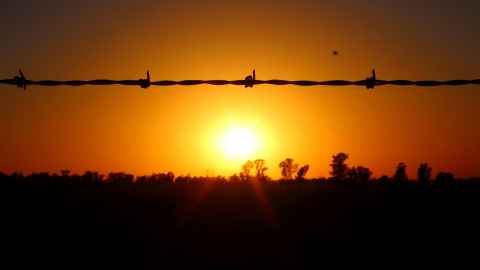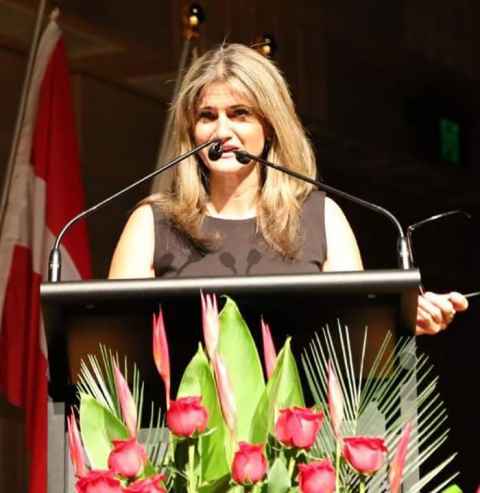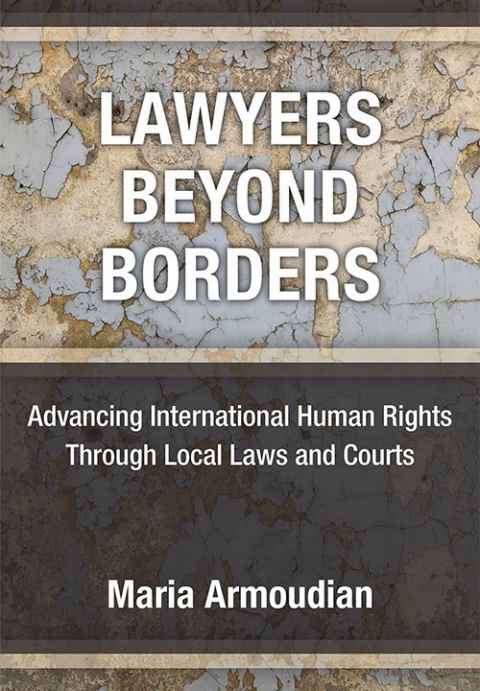Mai i te whakatuapeka ki te kēhi o te kōti
13 September 2021
Ko te mahi auaha o ngā roia i kōkiri i ngā kēhi tūkino mana tangata puta noa i te ao te kaupapa o tētahi pukapuka hou nā te mātanga torangapū o Waipapa Taumata Rau a Tākuta Maria Armoudian.

I roto i te Lawyers Beyond Borders, ka tirotiro a Tākuta Amoudian, pūkenga matua mō te tōrangapū me ngā pāhekohekotanga me ngā iwi o tāwāhi, i ngā kēhi whaihua pērā i ngā pārurenga o te ‘Pakanga ki ngā Terorehe’ o Amerika i mauheretia me te kore i whakawāhia i Abu Ghraib me Guantanamo Bay, tae atu ki ngā hara ki ngā iwi taketake me ō rātou kāinga tupu i ngā kamupene pērā i a ExxonMobil i Initonīhia me Shell i Ngāitiria.
Hei tā Tākuta Amoudian he maha ngā kēhi kāore i whakapaehia ka wikitoria.
“I mahia aua mahi tūkino i waho atu o Amerika, i ngā wāhi e noho ana ētahi rōia maha, he manene ngā pārurenga, ina he rawa ō rātou, he ruarua noa iho, he mana nui ngā tāngata hara, he nui ngā rawa, he maha ngā hononga, he mema kāwanatanga, he hōia, he rangatōpū whenuarau rānei. Otirā e rārangi mai ana ngā pūnaha ā-ture, ā-tōrangapū hoki hei tūtukinga waewae mā ngā pārurenga."
Ahakoa e kore te ngaukino o te tūkinotanga e memeha, e kore ngā whanaunga i kōhurutia e hoki mai, e kore hoki te whenua i raupatuhia e hoki mai, e ai ki a ia kua kōkiri ēnei rōia i ngā mahi ture tika tangata o te ao, ā, i ētahi wā, kua hāmenehia ngā tāngata hara, kua whai utu hoki mō ngā pārurenga. I roto i aua mahi, hei tāna, kua raru ētahi i roto i ngā whenua kaikoka, tōrangapū huirangi hoki, kua whakarongo ki ngā tini hāora o ngā whakataki kōrero taumaha, te tuku i tō rātou wā me ngā pūkenga, ā, kāore i whakapāhunu i ngā ātetetanga o te Kōti Matua e matawhāiti ana te titiro.

Kua whakaatu ēnei rōia mā roto i ngā ariā, te auaha, te manawaroa me te whakapau kaha, ka taea te tika mō te hunga kua taka 'ki raro i te ture'.
"Ā ko te kī a tētahi rōia, 'Ehara tēnei i te mahi mā te hunga ngākau hopohopo'. Ka mahara ia ki te wā i mau ia i ngā rohenga riri i Koromōpia me Initonīhia me ngā 'wheakotanga tino whakawehi' i a ia e rapu mōhiohio ana. I Aceh, hei tauira, i mau ia i roto i tētahi pakanga pū, ā, ka mate ia ki te haere ki te taha me te noho puku i tōna waka. Engari e ai ki tana kōrero, koinei ngā āhuatanga ka pā ki ngā tāngata katoa i te pae o te riri."
Ka kapi i te pukapuka ngā rautaki ā-ture auaha i para i ngā huarahi hou ki te tika, i te wā i hapa ngā huarahi taketake; ngā kaikōkiri ake, me ā rātou hihikotanga, āhua hoki, me te rere o te mōhiohio; ahakoa ngā taero maha, nā te aha i whai wāhi ai ngā meka waiwai i te kōti mai i te aupēhitanga?
I whirinaki atu ngā rangahau ki te whānuitanga o ngā kōrero mai i ngā uiui whaiaro, ngā uiui pūranga rānei ki ngā kaikōkiri, ngā mauhanga a te kōti, ngā tuhinga ā-ture me ngā tohenga ā-waha, ki ngā tuhinga niupepa me ngā mauhanga tohenga ā-hui taumata.
Nō reira i muri i te tuhi mō te māia me te manawaroa o ngā pārurenga, raupapa atu ki te māngai ā-ture horopū, pūmau hoki, e rorotu ana ia ka tōkeke ake te ao?
"Tērā ngā tauira o te angitu pai, pērā i ngā tāngata taketake i Pēma me Ngāitiria, i toa i a rātou ngā kēhi miriona-maha ki ngā kamupene hinu rangatōpū whenuarau, nā rātou i tahuri i ō rātou ao, me ō rātou oranga; ā, ko aua whakataunga kei te āwhina ki te whakatipu anō i ō rātou hapori."

Engari ahakoa he akiaki nui ēnei whanaketanga, e whakapono ana ia, he iti noa ngā wikitōria i waenganui i ngā hara whānui, moroki hoki.
"Ko te mea pōuri kē, e haere tonu ana ngā mahi whakamamae, kōhuru iwi me te whakataurekareka moroki, ā, kāore he mutunga, kāore he hāmene, ā, kāore he whakautu. Ka whai wāteatanga ngā kaihara nā te uaua o te whakawā i te whānuitanga o ngā mahi tūkino, ā, kua kore ngā pārurenga e whai urupare."
Engari e whakapono ana ia, kei konei te wāhi e whai take ai ngā wawaonga, ngā ariā me ngā mōhiohio e tāmuramuratia ana i te pukapuka.
"Kāore he tikanga e mea ana e kore e taea e tātou te hanga i te ao kia tika, māna, kua rite tātou ki te whakaae atu ki te ao tikakore e noho nei tātou. Kua whakaatu ēnei rōia mā roto i ngā ariā, te auaha, te manawaroa me te whakapau kaha, ka taea te tika mō te hunga kua taka 'ki raro i te ture'.
Ka whakaputaina a Lawyers Beyond Borders e Michigan University Press hei te Mahuru 2021.
From cover up to court case: fighting for justice against the odds
The ground-breaking work of lawyers who have taken on cases of egregious human rights abuse around the world is the focus of a new book by University of Auckland politics expert Dr Maria Armoudian
In Lawyers Beyond Borders, Dr Amoudian, a senior lecturer in politics and international relations, examines pivotal cases; ranging from victims of the US ‘War on Terror’ imprisoned without trial in Abu Ghraib and Guantanamo Bay, to crimes against Indigenous people and their homelands by companies like ExxonMobil in Indonesia and Shell in Nigeria.
She says many of these cases were among the most unlikely to be slated for victory.
“The abuses occurred outside of the US, where many of these lawyers are based, the victims are aliens, usually with few, if any, resources, the perpetrators are usually powerful, resourced, and well-connected, often members of governments, militaries, or multinational corporations. And the legal and political systems’ structures are mostly stacked against the victims.”
And while nothing can ever reverse the trauma of torture or bring back murdered loved ones or stolen lands, she says these lawyers have nevertheless blazed a trail in international human rights law and in notable instances, successfully held perpetrators to account and won compensation for victims.
The impossibility of adjudicating such widespread abuses gives many violators a pass and leaves their victims without remedy.
And while nothing can ever reverse the trauma of torture or bring back murdered loved ones or stolen lands, she says these lawyers have nevertheless blazed a trail in international human rights law and in notable instances, successfully held perpetrators to account and won compensation for victims.
In the process, she says, some have made themselves targets in violent and politically unstable countries, listened to hundreds of hours of harrowing testimony, donated their time and skills and remained largely undaunted by resistance from the increasing conservative Supreme Court.
“As one lawyer said, ‘This is not a profession for the faint of heart’. Caught in conflict zones in Colombia and Indonesia, he recalled ‘very, very harrowing experiences’ while fact-finding. In Aceh, for example, he was caught in a gun battle and had to pull off the road and lie low in his car. But as he says, those are things that happen to anyone in a war zone.”
The book covers the creative legal strategies that have forged new paths to justice when traditional avenues failed; the advocates themselves and their motivations and dispositions, and the flow of information; given the vast obstacles, how these vital facts went from being suppressed to having their day in court.
These lawyers have shown that through ideas, creativity, patience and elbow grease, justice can be won for those who have fallen ‘below the law’.
The research relied on a range of material from personally conducted or archived interviews with advocates, court records, legal documents and oral arguments, to news articles and congressional debate records.
So after writing about the bravery and perseverance of victims combined with staunchly committed legal representation, is she optimistic about the world becoming a fairer place?
“There are examples of great success, like the Indigenous people in Burma and Nigeria, who won a multi-million dollar lawsuits against powerful multinational oil companies which had upended their lives and livelihoods; and those settlements are going a long way to rebuilding their communities.”
But while these developments are encouraging, she believes they’re only a few wins among widespread and ongoing violations.
“Tragically, torture, genocide and modern slavery continue mostly unabated, unprosecuted, and unredressed. The impossibility of adjudicating such widespread abuses gives many violators a pass and leaves their victims without remedy.”
However she believes this is where agency and information of the kind highlighted in the book matter.
“There is no reason that we can’t make the world more just, unless we are willing to collectively accept an unjust status quo. These lawyers have shown that through ideas, creativity, patience and elbow grease, justice can be won for those who have fallen ‘below the law’.
Lawyers Beyond Borders: Advancing International Human Rights through Local Laws and Courts is published by University of Michigan Press (September 2021).